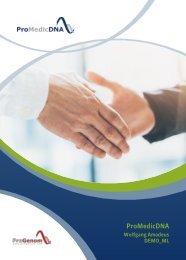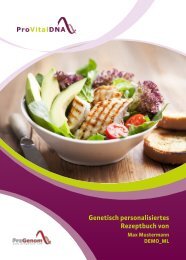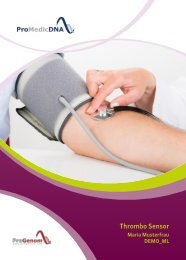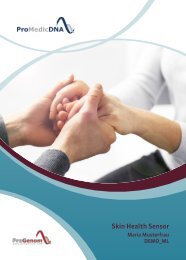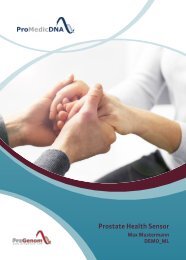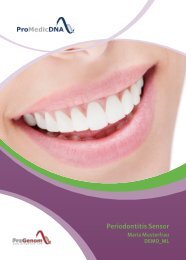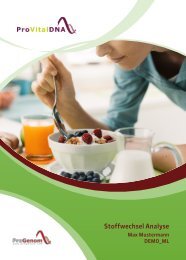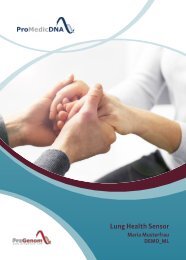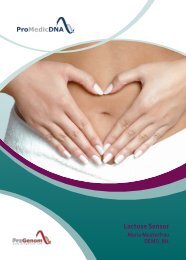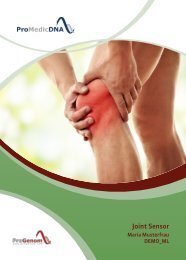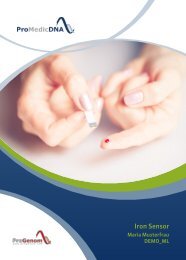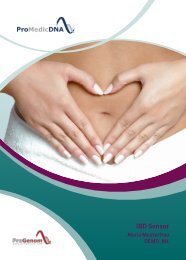ProVitalDNA - Package - DEMO EN
non-medical analysis - ProVitalDNA
non-medical analysis - ProVitalDNA
You also want an ePaper? Increase the reach of your titles
YUMPU automatically turns print PDFs into web optimized ePapers that Google loves.
Alcohol<br />
Alcohol is a substance that can cause a variety of<br />
health related problems if consumption is too high.<br />
Due to genetic differences, some people are more<br />
sensitive to the negative effects of excessive<br />
alcohol consumption.<br />
Alpha lipoic acid<br />
ALA is a strong antioxidant that helps the body<br />
neutralize toxic free radicals, that would otherwise<br />
cause chain reactions of damage to cells and<br />
tissues.<br />
Arachidonic acid<br />
Arachidonic acid is part of the body's secondary<br />
messenger system and can trigger negative<br />
reactions in some people. Persons with a genetic<br />
predisposition to increased inflammatory reactions<br />
should avoid arachidonic acid.<br />
Fiber<br />
Fiber consists of indigestable plant material that<br />
does not enter the body but remains in the<br />
intestine where it aids in mechanical breakage of<br />
food components.<br />
Cholesterol<br />
The body produces cholesterol on its own but also<br />
absorbs it from our diet. A surplus of cholesterol<br />
can have a variety of negative effects on the body.<br />
Similar to folic acid, this vitamin can aid in<br />
stabilizing homocysteine levels, but only if a certain<br />
genetic variant is present. If this is not the case,<br />
Vitamin B2 has no effect on homocysteine levels.<br />
Fructose<br />
Fructose, also called fruit sugar is a small molecule,<br />
that can be absorbed into the bloodstream without<br />
having to be digested by enzymes. Some people are<br />
intolerant to this sugar and should reduce its<br />
consumption to avoid unpleasent symptoms.<br />
Total fat & total sugar<br />
These two energy sources are contained within<br />
most types of food and can lead to excessive weight<br />
if consumed in excessive amounts. Certain genetic<br />
types are particularily sensitive to the fat and sugar<br />
amounts in their diet and should reduce them if<br />
possible.<br />
Saturated Fats<br />
Saturated fats are one group of fats that are<br />
considered the "unhealthy fats" and can have a<br />
negative impact on heart health. Certain genetic<br />
types should particularily pay attention to the<br />
saturated fat content in their diet.<br />
Coenzyme Q10<br />
Coenzyme Q10 is an important antioxidant that the<br />
body can produces itself, but which also needs the<br />
action of a certain gene to be converted to the<br />
active form Ubiquinol. People who carry a genetic<br />
defect in this gene (NQO1) are unable to convert<br />
Coenzyme Q10 to the active form.<br />
Cysteine and Methionine (Amino Acids)<br />
Amino acids are the building blocks for proteins and<br />
are essential for life. Cysteine and methionine are<br />
such amino acids, that can however have a negative<br />
impact on bone health in some genetic types.<br />
Iron<br />
Iron is an important component of blood, that<br />
allows it to carry oxygen in the form of hemoglobin.<br />
Some genetic variants can cause the excessive<br />
absorption of iron, which can damage organs.<br />
Folic acid, Vitamin B6 & B12<br />
These vitamins help in regulating the homocysteine<br />
levels in blood, which are influenced by certain<br />
genetic variants. High homocysteine levels have a<br />
negative impact on heart health and should be kept<br />
low.<br />
Vitamin B2<br />
<strong>DEMO</strong>_ML Page 99 of 295




